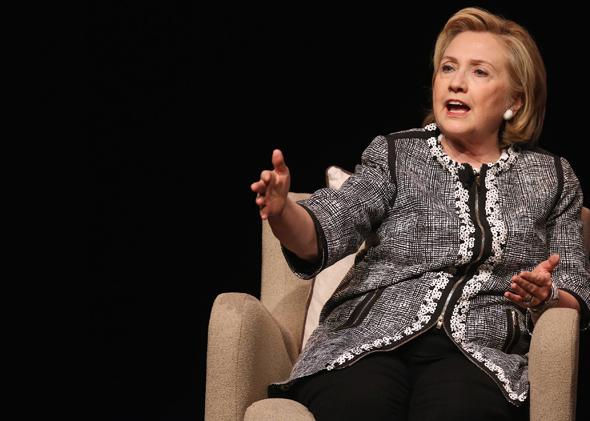After almost three weeks of silence, Hillary Clinton has finally spoken on the shooting of Michael Brown in Ferguson, Missouri.
Toward the end of her paid remarks at a tech conference in San Francisco, Clinton shifted gears to address the shooting and its related issues. “I applaud President Obama for sending the attorney general to Ferguson, and demanding a thorough and speedy investigation,” she said. “That’s both thorough and necessary to find out what happened, to see that justice is done, and to help this community begin healing itself.” On criminal justice reform, she echoed President Obama’s comments from last week’s press conference. “We cannot ignore the inequities that persist in our justice system,” she said, “inequities that undermine our deepest values of fairness and equality.” Clinton also condemned the draconian police response to peaceful protesters. “Nobody wants to see our streets look like a war zone,” she said. “Not in America, we are better than that.”
From there, Clinton addressed racial prejudice and inequality. But unlike Obama—whose comments were limited to banalities and “both sides” posturing—she had something smart to say.
“Imagine what we would feel and what we would do if white drivers were three times as likely to be searched by police during a traffic stop as black drivers, instead of the other way around,” she said, “if white offenders received prison sentences 10 percent longer than black offenders for the same crimes, if a third of all white men—just look at this room and take one third—went to prison during their lifetime. Imagine that. That is the reality in the lives of so many of our fellow Americans and so many of the communities in which they live.”
The few times President Obama has made serious comments on race, he’s been candid, personal, and conciliatory. He’s either tried to universalize his experience—as he did in his 2008 Philadelphia speech—or contextualize the particular experiences of black Americans, as he did in his 2013 remarks on the George Zimmerman verdict. Put simply, being black lets Obama empathize with black Americans in a way unique to his presidency. At the same time, it acts as a limit on what he can say. Or, as I noted on Tuesday, Obama can’t address racial issues without polarizing the public along racial lines. He tiptoed around Ferguson, but given the rancor caused by his comments on Henry Louis Gates’ arrest or Trayvon Martin’s killing, it was the smart path to take.
Clinton’s statement is neither candid, personal, or especially conciliatory. Instead, it’s a little blunt, and in a good way. She asks for understanding and doesn’t give her listeners a rhetorical escape. “Imagine that,” she says, pushing her audience to conjure a world where white men were targets for law enforcement, and where their lives were routinely derailed for trivial offenses.
There’s also the optics of the audience. When most white politicians talk on race or racial subjects, they go to a black audience. Hence Ken Mehlman’s 2005 apology to the NAACP for the GOP’s “Southern Strategy,” or more recently Reince Preibus’ comments on Republican outreach at this year’s convention of the National Association of Black Journalists.
I’m sure there were black people in the audience in San Francisco, but this was Silicon Valley. Clinton was talking to white people. And she was asking them, as white people, to show empathy and concern for the conditions of their black fellow citizens. I wouldn’t say this is unprecedented, but it is rare. Especially since there’s no attempt to deflect or blame black Americans for their own problems. Clinton doesn’t mention “black-on-black crime” or give a brief respectability lecture. She simply says, Look at how we treat them, and imagine if it were you.
In 2012, political scientist Daniel Gillion found that in his first two years in office President Obama spoke less on race than any Democratic president since 1961. And judging from his relative silence since then, I expect that when Obama leaves office, he will have said less on racial questions than most recent presidents, period.
For Americans who wanted Obama’s voice on race, this is disappointing. At the same time, there’s a decent chance we’ll get Hillary Clinton’s voice on race, and while the modern presidency brings political limits on what any president can say, that might be the better alternative.
In the same way that only a hardline anti-communist could go to China and only an arch-conservative could raise taxes, it might be that it takes a white person in the White House to have real candor with white people on race.
